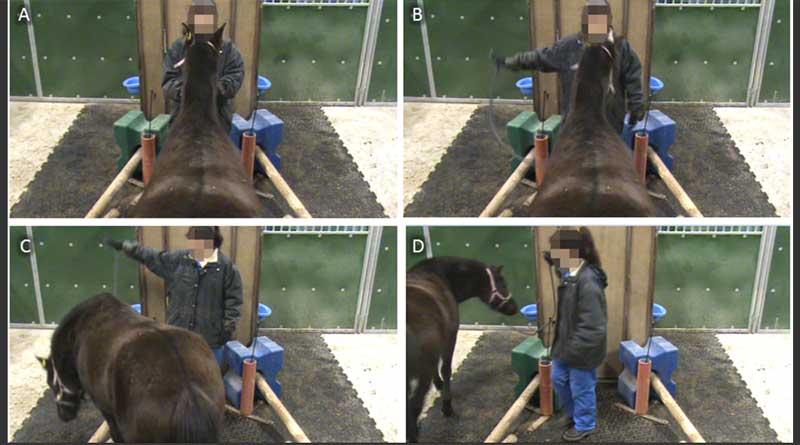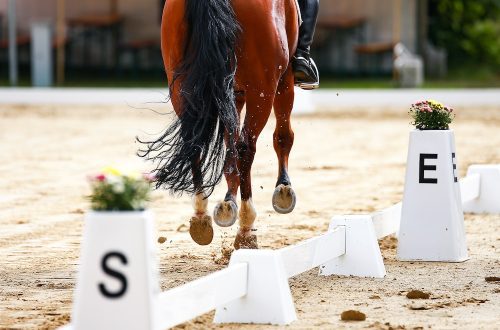Study: The Effect of Horse Personality Type on Horse Training
Study: The Effect of Horse Personality Type on Horse Training

Studying proccess. (A) Horse ready, in starting position. (B) The experimenter gives the first indicator in the left compartment. (C) The horse enters the left compartment. (D) The horse has successfully entered the left compartment and will receive the reward (food) in the left trough.
French researchers from the National Institute for Agricultural Research (INRA) (Matilda Valenchon, Frédéric Levy, Chantal Mousou, and Lea Lanside) asked how stress, positive and negative reinforcement, and horse personality affect horse training outcomes.
It was found that pre-stress (stressors were not related to the learning task) had a negative impact on the results of subsequent learning, mainly in conditions of positive reinforcement. In this case, the personality type of the horse was important.
In the absence of external stressors, horses rated as the most shy on personality tests performed better with negative reinforcement and worse trained with positive reinforcement.
The experiments involved 60 Welsh mares, each of which previously passed a well-known personality test, during which the fearfulness, sociability of the horse, its reactivity towards a person, the level of motor activity and sensitivity to touch were assessed.
Then the animals were divided into four groups (15 horses each). The horses were required to perform a specific task – to enter one of the two rooms, which was shown to her by the experimenter by giving a visual signal.
Two groups were trained by negative reinforcement, two by positive reinforcement. At the same time, one of the groups with negative reinforcement began to perform the task immediately after exposure to an external source of stress, just like one of the groups with positive reinforcement.
The sources of stress were loud noises (barking dogs, ringing bells, loud human speech, etc.), surprise (the rustling of a tarpaulin, a stream of water or air directed at a horse), or an object unfamiliar to the horse (a colorful cardboard box or balloons).
In the absence of unrelated tasks sources of stress, the effectiveness of training in all groups did not differ. However, the use of external stressors has been found to impair learning performance.
“Interestingly, this inefficiency was less when using negative reinforcement learning,” the researchers reported in the open access journal PLOS ONE. — Negative reinforcement, which was considered a task-related stressor, could counterbalance the impact of an external stressor by focusing the horse’s attention on learning the task.”
The scientists concluded that the effectiveness of training depends on the type of horse’s personality, the presence or absence of pre-stress, and the type of reinforcement.
The results showed that when using negative reinforcement—task-related stress—the most shy horses were the best learners when external sources of stress were not used. However, they became worse when external sources of stress appeared. (“When positive reinforcement was used, the most shy horses learned worse, with and without the use of stressors unrelated to the learning task.”
It is possible that the positive impact of negative reinforcement on performance in terms of focusing on a task could be enhanced in shy individuals. This may explain their improved performance in the absence of non-task-related stressors. “On the contrary, positive reinforcement is not a source of stress and shy horses are distracted by their surroundings.”
“When non-task stressors were added, the learning efficiency of the most shy ones consistently declined, regardless of the type of reinforcement.”
“Impaired learning and focusing processes caused by stressors unrelated to the task are likely to be more pronounced in fearful individuals who are more responsive to various forms of stressors.”
The study showed that the effectiveness of training can be influenced by other aspects of personality.
“Locomotor activity was positively associated with measures of negative reinforcement, regardless of exposure to non-task stressors,” the researchers noted.
They suggested that locomotor activity may generally reflect a tendency to initiate actions, as they had previously observed such a positive effect by posing learning tasks that required a shift in body position similar to that required in this case.
In addition, reactivity towards a person was found to be negatively associated with learning outcomes only in the group of negative reinforcement and the presence of an external source of stress.
“Horses less fearful of humans responded more easily to non-task stressors because they were more attentive to human movements and cues.”
In a group of 15 animals, only a few significant correlations were found between personality variables and learning outcomes.
“In order to reveal the full impact of personality on learning ability, it would be ideal to conduct this study with bоa larger number of subjects would probably require about a hundred horses. In addition, it is a pity that it is impossible to conduct an experiment with the same number of representatives of different breeds of horses. However, we must emphasize the fact that all Taken together, experiments done on horses show us consistent relationships between personality and learning ability. This means that the corresponding correlations are not random.”
“Our results provide important clues for personalized learning according to the needs of each animal…The present study shows that positive and negative reinforcement can lead to equivalent learning outcomes in the absence of non-task-related stressors.
Considering that previous studies have noted the long-term promising effects of positive reinforcement on training and on horse-human relationships, our results provide additional evidence for the effectiveness of using positive reinforcement in equine training, while the use of negative reinforcement still dominates traditional training methods. “.
Interestingly, the use of food rewards as reinforcement under stressful conditions may not be sufficient.
“Indeed, stress-induced loss of food motivation can render reinforcement ineffective and become an additional source of stress. Our analyses, including personality analysis, suggest that stress is a key factor in understanding how animals differ in terms of learning in relation to their personality. Anticipating the response of shy animals when faced with a learning challenge is possible by not only assessing the level of stress, but also the nature of the stress (task or non-task related) and their possible interactions.”
More research is needed to more accurately determine when the transition from favorable to unfavorable learning conditions occurs, depending on the type and intensity of the stressor and how it relates to the horse’s personality, more research is needed.
Translation by Valeria Smirnova (a source).




